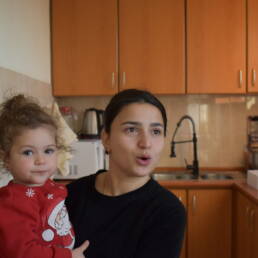Our new report reveals: out of the top government humanitarian donors, only three track the direct flow of their funds to local NGOs and only one meets the target of allocating 25% of their funding to them. Caritas Europa calls for an urgent decentralisation of the humanitarian aid sector.
In a new report launched today, Caritas Europa, in collaboration with the Centre for Humanitarian Action (CHA), analyses the considerable disparity between rhetoric and reality in supporting local humanitarian organisations. “Unfulfilled Promises: Addressing the gap between commitments and practice in locally led humanitarian action” presents an innovative index ranking of 20 leading government donors, UN agencies and international NGOs based on the quality of their commitment to decentralise the humanitarian aid system.
In 2016, the Grand Bargain was launched during the World Humanitarian Summit in Istanbul and included a commitment by the most prominent global humanitarian donors to allocate 25% of international humanitarian aid directly to local organisations. But seven years on, in 2022, only 1.2% of aid was estimated to have been effectively distributed in this way. The humanitarian aid system remains heavily centralised and decision-making power remains in the Global North, as shown in the testimonies of two local actors, Caritas Lebanon and Caritas Colombia, who feature in the report.
Local organisations often feel excluded from decision-making processes. International players sometimes impose their own agendas, neglecting the needs of affected communities.”
Local organisation in Lebanon who spoke on condition of anonymity
In partnerships with international organisations, we’ve managed to build equitable and transparent dynamics, influencing decision-making processes positively. However, funding access and top-down priority setting remain significant challenges.”
Local organisation in Colombia who spoke on condition of anonymity
Main findings
The report’s index assesses the top ten government donors, including the European Commission, Germany, Canada the United States, and international actors, including UN agencies like UNHCR, UNRWA, UNICEF, WFP, WHO, and international NGOs, including the International Rescue Committee, World Vision International, Save the Children, Norwegian Refugee Council and Médecins Sans Frontières.
Among the top government donors, only three track the direct flow of their funds to local groups, with France being the sole country meeting the 25% target. In comparison to government donors, the availability of international organisations’ data is better, but their performance still has much room for improvement, with many having policies in place to shift power to local organisations but limited monitoring of the implementation of these policies.
Even the three best-performing actors (UNHCR, WFP and UNICEF) scored a maximum of only 66 out of 100 points, with scores based on a self-perception survey, factual reporting and an assessment by local humanitarian organisations.
Recommendations
Caritas Europa urges the European Union and donor governments, along with UN agencies and INGOs, to honour their commitments by ensuring transparency in tracking how funds are distributed and to step up their efforts to meet the 25% target. To do so, they should also accept more of the financial and security risks that are currently borne by local organisations. International donors must also consistently include the leadership of local entities in decision-making fora.
Local humanitarian workers and volunteers are there before, during and after the crises. Transferring power to them is not just cost-effective; it is a serious matter of demonstrating the values of self-determination, subsidiarity and justice.”
Msgr. Michael Landau, President of Caritas Europa
More information
Jean-Yves Terlinden
International Cooperation and Humanitarian Director
Tel: +32 (0)2 235 03 95
Mob: +32 (0)492 65 65 81
jterlinden@caritas.eu
Susan Dabbous
Media Officer
Tel: +32 (0)2 235 03 94
Mob: +32 (0)478 58 54 35
sdabbous@caritas.eu




